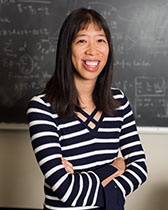Professor Wen-fai Fong Honored with Steward Observatory’s 2024 Marc Aaronson Prize
August 15, 2024
This year, the 2024 Marc Aaronson Prize recognizes Northwestern University professor Wen-fai Fong for her pioneering, multi-wavelength observations characterizing fast transients and the galaxy environments that host them. Fong studies some of the Universe’s most cataclysmic events, including gravitational waves that are launched when neutron stars and black holes merge, and gamma-ray bursts –the most powerful cosmic explosions since the Big Bang.
The prize celebrates the life and research of Steward Observatory astronomer Marc Aaronson and recognizes promising early-career astronomers who match Marc’s spirit of joy and innovation.
The prize honors the legacy of Marc Aaronson, a Steward Observatory astronomer whose research in the 1980s advanced our understanding of the age and size of the Universe. Aaronson came to Steward Observatory as a postdoc after receiving his PhD degree from Harvard in 1977 and became an Associate Professor in 1983. His astronomical research focused on many of the most important problems of observational cosmology: the cosmic distance scale, the age of the Universe, the largescale motion of matter, and the distribution of invisible mass in the Universe.
Aaronson made important contributions to our understanding of stellar populations in the Large
Magellanic Cloud. His research, says Steward Observatory Deputy Director and Astronomer Dennis Zaritsky, was “audacious.”
After Aaronson was tragically killed in an accident on Kitt Peak in 1987, Steward Observatory worked with his widow to establish a prize to remember Marc’s “joy in astronomy and the way he was active and interested and creative and all the things he did,” says Zartisky. The prize seeks to honor early-career astronomers who embody that same spirit and spark for innovation.
Three winners of the Marc Aaronson Prize have gone on to win the Nobel Prize.
Fong, this year’s winner, spent time at Steward Observatory as a postdoc, and now studies explosive gamma-ray bursts at Northwestern. Of her research, the selection committee writes:
Her work on short gamma-ray burst afterglows provided the strongest evidence for binary neutron star mergers as the progenitors of short duration gamma ray bursts prior to the joint detection of gravitational waves and light from GW170817, helped characterize the role of neutron star mergers in creating heavy elements, and established the environmental conditions under which neutron star binaries form, evolve, and merge. She continues to push the frontier forward, more recently spearheading the identification and characterization of the host galaxies of fast radio bursts (FRBs), constraining the nature of FRB progenitors.
The research conducted by Fong and her group uses observations from a large variety of telescopes spanning radio, optical, near-infrared, and X-ray wavelengths on the ground and in space to explore questions such as: What are the energy sources powering astrophysical transients? What is the composition of material ejected from these sources, and what can this tell us about the birthplaces of heavy elements?
Fong’s studies of explosive gamma-ray bursts and gravitational waves may help advance what we understand about how and where heavy metals form in our universe, piecing together clues into the origins of our own planet and the elements necessary for life.
This is the first Marc Aaronson Prize awarded since 2019, and the prize has grown since then: the winner now receives a $5000 prize to celebrate and advance their work. Fong will visit Steward Observatory in September to give a colloquium (Sept. 12th) and a public science talk for Steward’s Public Evening Lecture series (Sept. 13th). It is a rich opportunity for cross pollination of ideas among astronomers at the University of Arizona and NOIRLab.
